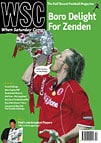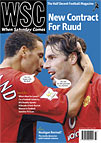 Dear WSC
Dear WSC
Following the recent kerfuffle between Ashley Cole, Nicolas Anelka et al at Highbury, most commentators seemed to agree that Cole was as much to blame as Anelka and deserved to walk too. Obviously Cole’s reputation is now going before him, but surely in this case Cole had every right to pick up the ball and return it to the centre circle in his own time? What none of the so-called “experts” ever cares to mention in these cases is that once a goal has been scored, the scored-against team has possession of the ball and should not expect to have to deal with a full-on assault from the opposing team’s front line (everyone seemed to conveniently miss Robbie Fowler’s rugby tackle during the same incident). If they waste time returning it, the ref can show a yellow card and add on a few seconds accordingly – simple. OK, Cole raised an arm, but didn’t we all when someone tried to grab our ball? No, in this case the referee was absolutely right and for once the video panel also saw sense. I think it was Eusebio who started this trend for grabbing balls out of nets in the 1966 World Cup against North Korea and the sooner FIFA send out a directive banning such blatant gamesmanship the better for all concerned.
Martin D Ling (not the Os manager), Bethnal Green
Search: ' Supporters Direct'
Stories
 Nottingham council have called Forest’s bluff over their cash crisis, leaving Al Needham and many fellow fans in no doubt as to who is to blame for the problems at the City ground
Nottingham council have called Forest’s bluff over their cash crisis, leaving Al Needham and many fellow fans in no doubt as to who is to blame for the problems at the City ground
It’s no fun at all being a supporter of Nottingham Forest these days, but their latest twirl on the morbid carousel of financial mismanagement takes the biscuit, if not the whole packet. You’ll remember Forest – big club last century, won a few things, endearingly bonkers manager, held the world’s most jubilant relegation party, yo-yoed between the Premiership and the First Division for a bit under assorted bosses. At time of writing, they have just hauled themselves out of a winless streak spanning 18 games and are staring relegation to the Second Division squarely in the face – but at least we could take comfort in the fact that we weren’t as financially ravaged as Notts County.
 Newspaper rumours of a Manchester United bid for Steven Gerrard set Ashley Shaw thinking about just how rare transfers involving Liverpool have been in the modern era
Newspaper rumours of a Manchester United bid for Steven Gerrard set Ashley Shaw thinking about just how rare transfers involving Liverpool have been in the modern era
As transfer stories go, Steven Gerrard’s recently rumoured move to Old Trafford would seem about as likely as an Osama Bin Laden peace mission to Washington. But why should this be? If Manchester United and Liverpool were ordinary businesses and a key member of staff spotted an opportunity for lucrative promotion at a rival company, then there would be few bars to a “transfer”.
 The word ‘Judas’ has been heard a lot lately, but Adam Powley refuses to ignore a fundamental difference between fans and players
The word ‘Judas’ has been heard a lot lately, but Adam Powley refuses to ignore a fundamental difference between fans and players
The issue of loyalty is a bit of a bête noire for football supporters. While fans readily display their devotion to the cause, players rarely match such selflessness. That discrepancy was sharply illustrated by three high-profile moves during the recent transfer window. The deals involving Scott Parker, Jermain Defoe and Louis Saha accounted for an aggregate outlay of over £30 million – not bad going for three young players, none of whom is yet to make a significant impact at full international level. But while the purchasing clubs glowed in the satisfaction of being seen to splash cash in supposedly depressed times, at the clubs they departed from there were bitter recriminations.
 As the anti-racism organisation celebrates its tenth birthday, Tom Davies spoke to Kick It Out co-ordinator Piara Powar about progress made and the battle still ahead
As the anti-racism organisation celebrates its tenth birthday, Tom Davies spoke to Kick It Out co-ordinator Piara Powar about progress made and the battle still ahead
With the well established Kick It Out campaign now ten seasons old, it’s easy to forget just how marginal an issue anti-racism in football once was. In the 1980s it took the brave efforts of supporters themselves, often at the places with the worst reputations such as Leeds and Chelsea, to drag the issue to public prominence. And it’s tempting, now, to congratulate ourselves on just how far we’ve come.